|
|
|
Sort Order |
|
|
|
Items / Page
|
|
|
|
|
|
|
| Srl | Item |
| 1 |
ID:
161268
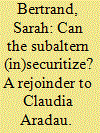

|
|
|
| 2 |
ID:
161266
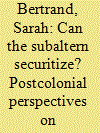

|
|
|
|
|
| Summary/Abstract |
Drawing on postcolonial and feminist writings, this article re-examines securitization theory’s so-called ‘silence-problem’. Securitization theory sets up a definably colonial relationship whereby certain voices cannot be heard, while other voices try to speak for those who are silenced. The article shows that the subaltern cannot securitize, first, because they are structurally excluded from the concept of security through one of three mechanisms: locutionary silencing, illocutionary disablement, or illocutionary frustration. Second, the subaltern cannot securitize because they are always already being securitized and spoken for – as in this case by the well-meaning intellectuals trying to highlight and remediate their predicament. Third, the subaltern cannot securitize because the popular rendering of securitization theory as critical obfuscates and rationalises their marginalisation. This article thus reveals the ‘colonial moment’ in securitization studies, showing how securitization theory is complicit with securitizations ‘for’ that marginalise and silence globally, not just locally outside ‘the West’.
|
|
|
|
|
|
|
|
|
|
|
|
|
|
|
|
| 3 |
ID:
161271
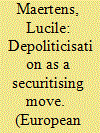

|
|
|
|
|
| Summary/Abstract |
Created in 1972, the United Nations Environment Programme (UNEP) has a normative mandate to promote the protection of the environment at the international level. However, since 1999, the organisation has been conducting field assessments in postconflict situations and addressing the role of natural resources in conflict, framing the environment as a security issue. To do so, the programme insists on its neutrality as a technical and ‘apolitical’ actor within the UN system. Considering depoliticisation as a political act, this article unpacks the concrete practices by which international organisations (IOs) enact depoliticisation. It further argues that IOs can perform securitising moves through practices and techniques presented as outside of the political realm. It draws upon the recent work on depoliticisation at the international level and reinforces studies considering the links between (de)politicisation and securitisation.
|
|
|
|
|
|
|
|
|
|
|
|
|
|
|
|
| 4 |
ID:
161270
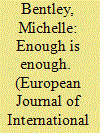

|
|
|
|
|
| Summary/Abstract |
The clash between national security and civil rights comprises one of the most controversial aspects of counter-radicalisation strategy. Analysts present this as a conflict between the need for restrictive security measures (for example, surveillance) and the need to uphold civil liberties (for example, privacy and freedom of speech). In responding to this dilemma, the article examines how this binary normative struggle impacts on the rhetorical presentation of counter-radicalisation policies – in particular, the UK Prevent Strategy and the rhetoric employed by UK Prime Minister and former Home Secretary, Theresa May. It argues that the normative environment has obliged May to construct rhetoric within the context of, what is termed here, normative invalidation. In facing two comparably compelling and related norms of action, May is necessarily required to invalidate or neutralise any norm not adhered to as an essential characteristic of rhetorical strategy. This is discussed in relation to the Strategic Narratives
|
|
|
|
|
|
|
|
|
|
|
|
|
|
|
|
| 5 |
ID:
161267
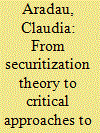

|
|
|
| 6 |
ID:
161272


|
|
|
|
|
| Summary/Abstract |
This article develops an International Practice Theory (IPT) approach to United Nations peace operations through the study of the UN Stabilization Mission in Haiti (MINUSTAH). MINUSTAH saw the introduction of new practices within the context of a UN peace operation, namely the use of joint military-police forces to conduct offensive action against armed groups that were labelled as ‘gangs’. While more objectivist problem-solving approaches would argue that the UN mission was simply adapting to the situation on the ground, an IPT lens reveals that there was considerable struggle to integrate these new practices within the repertoire of peacekeeping. The article argues for the benefits of applying an IPT lens to peace operations while proposing to develop theoretical and methodological approaches that have been less prominent in IPT. Theoretically, it posits that IPT can better articulate practice and discourse by paying more attention to what actors say about what they do.
|
|
|
|
|
|
|
|
|
|
|
|
|
|
|
|
| 7 |
ID:
161269


|
|
|
|
|
| Summary/Abstract |
The individualisation of punishment is a key element in liberal narratives about international law and international relations. This narrative has become an integral part of positive international law, especially the regimes governing the use of force and the prosecution of an international crimes. Rather than punishing states or entire societies, liberals claim, punishment has become restricted to those who incurred individual guilt. To liberals, the individualisation of punishment is part of a larger process of enlightenment and civilisation that has helped to fence atavisms like revenge. We do not question the emergence of an ever more sophisticated system of individual punishment in international law. However, we argue that punitivity has been more difficult to fully channel towards individuals and away from collectives than claimed. To be sure, punitive language has by and large been banned from the laws of armed conflict. We argue, however, that the absence of a punitive vocabulary does not equal the absence of punitivity. In contrast, current state practices of using armed force are still imbued with punitivity, however silenced in the current legal framework and thus pushed underground. Realising the presence of a punitive undercurrent, we argue, adds to a more comprehensive understanding of contemporary state practices.
|
|
|
|
|
|
|
|
|
|
|
|
|
|
|
|
|
|
|
|
|